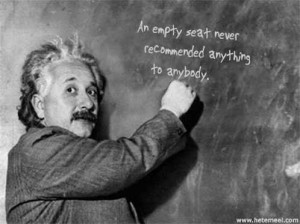 Imagine if Albert Einstein, the greatest scientific mind of the 20th century had pursued a career in arts & cultural marketing instead of the arguably less complex field of physics.
Imagine if Albert Einstein, the greatest scientific mind of the 20th century had pursued a career in arts & cultural marketing instead of the arguably less complex field of physics.
What would he have concluded?
Imagine the young Einstein arriving for his first day of work as the marketing director for a theatre company, museum or symphony:
- “You need to shave 7 percent from this season’s marketing budget,” says the Finance Director,
- We’ve got to launch an Obama-style social media strategy!” urges the Board Chairperson,
- “How is it that in a city this size we can’t find one theater-full of people to attend this weekend’s performance?” demands the Artistic Director,
- “Let me tell you how it worked when I got into the business.” says the CEO,
- “I think we should boycott advertising in the newspaper until they hire more arts writers!” suggests a donor,
- “We need to update our brand.” advises the head of the marketing committee.
Give Marketing Einstein some time to experience the arduous mechanics and opposing gravitational forces of expense budget and sales revenue, organizational mission and audience behavior, company culture and community dynamics.
It wouldn’t take long for Marketing Einstein to observe that the business of arts & culture depends not just largely, but entirely, on the word-of-mouth of audiences and fans.
Now envision him late at night, at home in his study, scribbling furiously on his iPad. Moments of frenzy alternate with long minutes of profound silence. The great mind is challenging the greatest of puzzles – weighing the arguments and counter arguments, the logic and the evidence, considering the obvious and the unknown – all while alternatively writing, thinking and arguing with himself out loud.
Finally, there is a Steven Spielberg-worthy moment – the clouds part, a light shines upon the exhausted but exhilarated Marketing Einstein, his frenzied hair standing out as if jolted by the surging brain power just beneath his skull. He rises in triumph.
“Ah-ha,” he says as he points his finger at the formula and equations. His eyes are ablaze! And from his dry lips, he utters these truthful words:
“An Empty Seat Never Recommended Anything to Anybody.”
Okay, it wasn’t really Albert Einstein who said that – despite the photo evidence!
I heard it from Mr. Lee Wochner (then Executive Director of the LA Stage Alliance) who shared his insight at the 2002 gathering of the Association of Performing Arts Service Organizations (APASO). To me, however, the effect was no less profound.
It is, I believe, a fundamental truth about the business of the performing, visual, cultural, literary, culinary and digital arts. It is the kind of foundational statement which should lead you to ask questions like, “If I believe this, then I must also believe…”
And yet, too many seats are empty.
Perhaps because we haven’t taken the time to revisit the very basic physics of where audiences come from – and why.
And really, it doesn’t take an Einstein to figure that out.
# # #
